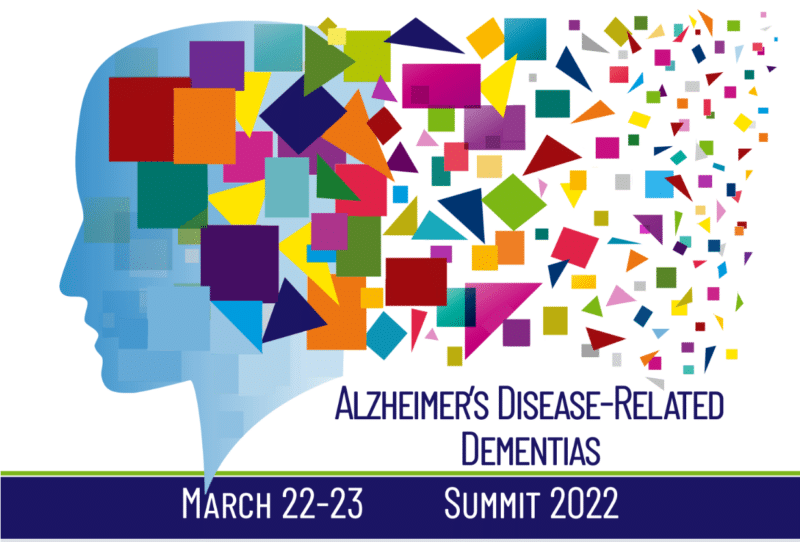Experts Address Vital Research Priorities for Related Dementias at ADRD Summit 2022

The Alzheimer’s Disease-Related Dementias (ADRD) Summit convened for its fourth event to gather input from the research community, as well as persons living with dementia, caregivers, patient advocacy organizations, and healthcare professionals, on recommendations for future research priorities for FTD and non-Alzheimer’s dementias, including Lewy body dementia and vascular dementia.
The National Institute of Neurological Disorders and Stroke (NINDS) hosted the triennial Summit in partnership with the National Institute on Aging (NIA). The ADRD Summit responds to the National Alzheimer’s Project Act (NAPA) that was signed into law in 2011, which is the national plan to address Alzheimer’s and other related dementias.
This year’s Summit, held entirely online Mar. 22-23, examined the prioritized recommendations drafted by eight committees prior to the meeting, and is intended to serve as a blueprint to help guide scientific research for related dementia types during the next five to ten years.
During the Summit, experts in each of the areas addressed by the committees composed the draft recommendations and reported on the progress made on the research recommendations set by the 2019 ADRD Summit. Those recommendations were revised based on scientific advances that have been made within the last three years. The draft recommendations will help to determine the dementia-related funding priorities for the National Institutes of Health (NIH) for the next three years. Based on the input received at the Summit, the recommendations will be revised further and presented to the NINDS Council for approval. Approved recommendations become research milestones in the national plan to address Alzheimer’s and other related dementias.
Since ADRD’s inaugural summit in 2013, FTD research initiatives have been a focal point of the event. AFTD Director of Research and Grants Debra Niehoff, PhD, noted that current advances in FTD clinical trials and therapies are the culmination of emerging FTD research and the priorities set in previous summits.
“In 2016, [AFTD Medical Advisory Council member] Dr. Rosa Rademakers spoke at that year’s Summit on the basic science of the C9orf72 gene — its discovery, what it meant, and how it was involved with FTD. Now we have C9orf72 therapies,” said Dr. Niehoff. “It’s a nice evolution from that basic science to the translational space, and now we’re going to be testing ideas in the clinic. It emphasizes the importance of the starting point as well as the process along the way.”
AFTD Senior Director of Scientific Initiatives Penny Dacks, PhD, and Director of Research Engagement Shana Dodge, PhD, were involved in the committees that helped to compose the draft recommendations. Dr. Dacks emphasized the progress that’s been made in FTD research since the last Summit in 2019.
“We have a lot of therapies being tested in clinical trials right now that did not exist three years ago — we’re getting that much closer to effective therapies. It’s become even more important that people participate in clinical research because we’re getting to the stage where we really need that participation for the clinical trials to succeed,” Dr. Dacks said.
Some major themes that emerged from the 2022 Summit included the urgent need for dementia-related biomarkers, as well as the overlap between FTD and two related diseases: amyotrophic lateral sclerosis (ALS) and limbic-predominant age-related TDP-43 encephalopathy (LATE).
“There are a lot of areas where the damage in FTD is quite similar to the damage of other conditions,” Dr. Dacks said. “We need to ensure that the researchers across these different groups are sharing data and sharing resources so that we can accelerate progress across all of the related dementia conditions.”
Additional themes from the Summit included discussions centering the need to increase the diversity among research participants and the scientific workforce. Researchers also discussed the neurological symptoms associated with the COVID-19 infection and their potential impact on long-term dementia risks.
The meeting also included a question and comment session for attendees, where persons diagnosed and care partners/caregivers provided commentary on the lived experiences of being impacted by dementia. AFTD Advocacy Manager Matthew Sharp, MSS, coordinated the live commentary session during the FTD portion and shared comments on the importance of equal access to diagnosis in FTD. AFTD Board Chair David Pfeifer and Board member Kacy Kunesh were among the group of commenters who responded to the draft recommendations.
Adam Boxer, MD, PhD, a 2016 recipient of an award from AFTD’s FTD Biomarkers Initiative, co-chaired the FTD portion of the Summit along with Celeste Karch, PhD. AFTD MAC member Chiadi Onyike, MBBS, MD, also participated in the Summit along with FTD Biomarkers Initiative awardees Anthony Fitzpatrick, PhD, and Leonard Petrucelli, PhD.
Review the ADRD Summit 2022 draft recommendations here.
By Category
Our Newsletters
Stay Informed
Sign up now and stay on top of the latest with our newsletter, event alerts, and more…
